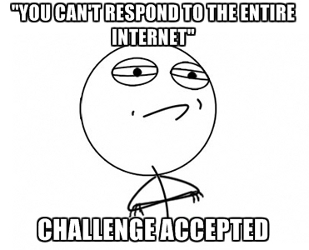 This is the first in a new category of blog – Q and A. Every now and then I get an email or a message via Facebook with a question related to something that somebody has just read at the blog or in an article, or heard in a podcast episode – or maybe just a question out of the blue about an issue in theology, philosophy or biblical studies. I haven’t answered every such question and I can’t do so in future either – not because I don’t appreciate being asked, but sometimes I’ve got a pile of emails sitting there and I just can’t justify replying to all of them, nor could I necessarily do so even if I tried. I’m really sorry if you’re one of those people who I haven’t replied to. This is what I do in my spare time.
This is the first in a new category of blog – Q and A. Every now and then I get an email or a message via Facebook with a question related to something that somebody has just read at the blog or in an article, or heard in a podcast episode – or maybe just a question out of the blue about an issue in theology, philosophy or biblical studies. I haven’t answered every such question and I can’t do so in future either – not because I don’t appreciate being asked, but sometimes I’ve got a pile of emails sitting there and I just can’t justify replying to all of them, nor could I necessarily do so even if I tried. I’m really sorry if you’re one of those people who I haven’t replied to. This is what I do in my spare time.
The Q and A category is one of the avenues I’m going to use to reply to some of these questions as best I can, albeit briefly. I especially welcome questions that are related to material in the blog or podcast, or material that I’ve had published somewhere. That’s just because I’m more likely to be able to answer the question if it’s in a subject I’ve dealt with before. But I’m open to any questions you have. At least every two weeks (maybe more often, depending on what time allows) I’ll publish one of those questions at the blog in the Q and A category along with my response. You can view previous Q and A blog entries by viewing the Q and A subject in the Subject drop down box over on the right, or by clicking on the Q and A button.
I don’t promise to be able to respond to every email (in fact I can promise that I won’t), but we’ll see how this goes!
The very first question in this series comes from Paulo in Indiana.
“I wonder, what is your view on privation theories of evil? Do you see certain limitations or weaknesses in these types of explanations?”
Thanks for the question Paulo. Talk about starting with a big one! A really satisfying answer to this would require a book length response (and I’m sure I will find myself saying this in reply to a lot of questions), but here are some summary thoughts.


 With the furore over same-sex marriage gaining steam both in the United States and in New Zealand, where the issue is about to be debated in Parliament, I thought I should say a few things about that recent study that’s got some people upset – The study that said the things that we are all supposed to just know aren’t right and, more importantly, shouldn’t be said, that (stated in very general terms) children do better when they have, in their home life, a man who is their father and a woman who is their mother (as opposed to only one parent or parents of the same sex).
With the furore over same-sex marriage gaining steam both in the United States and in New Zealand, where the issue is about to be debated in Parliament, I thought I should say a few things about that recent study that’s got some people upset – The study that said the things that we are all supposed to just know aren’t right and, more importantly, shouldn’t be said, that (stated in very general terms) children do better when they have, in their home life, a man who is their father and a woman who is their mother (as opposed to only one parent or parents of the same sex). What do we mean when we say that God is good? If I’m right, we shouldn’t mean that God is morally good.
What do we mean when we say that God is good? If I’m right, we shouldn’t mean that God is morally good. Apparently it has come to this: If you’re a Christian, then using your grey matter to articulate and defend the Christian faith just isn’t “Relevant.” And who would know better than Relevant magazine, where the number one priority is being, well, relevant?
Apparently it has come to this: If you’re a Christian, then using your grey matter to articulate and defend the Christian faith just isn’t “Relevant.” And who would know better than Relevant magazine, where the number one priority is being, well, relevant? With the discovery of the Higgs boson, a number of wishful thinkers have gotten rather giddy over the supposed religious implications of the finding.
With the discovery of the Higgs boson, a number of wishful thinkers have gotten rather giddy over the supposed religious implications of the finding. Coming up in late July / early August 2012 is a series of four free public lectures in Wellington by Professor William T. Cavanaugh. The series is titled Migrations of the Holy: Challenging the Myths of a Secular Age. Dr Cavanaugh is a Senior Research Professor at the Center for World Catholicism and Intercultural Theology at DePaul University in Chicago. He is also the 2012 St John’s Visiting Scholar in Religion at Victoria University in Wellington. The lectures are presented in association with Victoria University and St John’s Presbyterian Church.
Coming up in late July / early August 2012 is a series of four free public lectures in Wellington by Professor William T. Cavanaugh. The series is titled Migrations of the Holy: Challenging the Myths of a Secular Age. Dr Cavanaugh is a Senior Research Professor at the Center for World Catholicism and Intercultural Theology at DePaul University in Chicago. He is also the 2012 St John’s Visiting Scholar in Religion at Victoria University in Wellington. The lectures are presented in association with Victoria University and St John’s Presbyterian Church. This blog post isn’t about why I don’t reply to every email I get. The reason there is really just about being too busy too often. Sorry! This is about responding to what you find on the internet. Bloggers and authors: Should you reply to everyone who criticises you? I think the answer to this is obvious, but here’s what I have to say anyway. While the kind of criticism I have in mind is online, I suppose this advice applies in “real life” as well.
This blog post isn’t about why I don’t reply to every email I get. The reason there is really just about being too busy too often. Sorry! This is about responding to what you find on the internet. Bloggers and authors: Should you reply to everyone who criticises you? I think the answer to this is obvious, but here’s what I have to say anyway. While the kind of criticism I have in mind is online, I suppose this advice applies in “real life” as well. In what I think is a twisted irony, I’m about to become the bad guy by saying that we are not animals and we should not engage in retaliatory killing.
In what I think is a twisted irony, I’m about to become the bad guy by saying that we are not animals and we should not engage in retaliatory killing. David Baggett and Jerry L. Walls,
David Baggett and Jerry L. Walls,